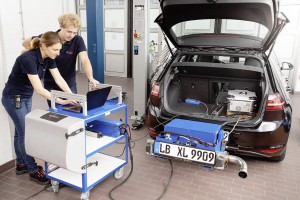Nearly three years after the start of “dieselgate” and Volkswagen’s nearly complete switch from diesels to battery electrics, auto supplier Robert Bosch GmbH says it has developed a method for cutting emissions from diesels to levels well below U.S. and European requirements.
If true, the move could save the diesel — at least in Europe where a number of cities are enacting bans on vehicles with emissions above certain levels.
“There’s a future for diesel,” Bosch CEO Volkmar Denner says in a statement announcing the breakthrough alongside the organization’s annual meeting in Stuttgart. “Today, we want to put a stop, once and for all, to the debate about the demise of diesel technology.”
Automotive supplier Bosch claims its new technology uses a combination of advanced fuel injection, a newly developed airflow management system to recirculate exhaust gases, and intelligent temperature management. Plus, it requires no additional new components and doesn’t increase the cost significantly.
(VW ups ante as it places $25B order for EV batteries. Click Here for the story.)
It drops nitrogen oxide emissions to one-tenth of the amount set under the stricter 2020 limits for Europe. Perhaps more importantly, it does so in real-world driving conditions regardless of weather or the type of driving being done.
“Combustion engines — whether powered by diesel or gasoline — will soon emit so little in the way of particulates and nitrogen oxides that they will have no significant impact on the air,” said CEO Volkmar Denner, at the company’s annual press conference in Stuttgart, Germany.
“For anyone with a pragmatic, non-ideological interest in improving the air in our cities, diesel engines and their further technological development will obviously be part of the solution. After this ecological rehabilitation, diesel can take off again. It is not combustion engines that are being made obsolete, but rather the debate about their imminent demise.”
(Click Here to see more about VW confirming plans for I.D. Crozz electric SUV.)
Bosch is one of the world’s largest suppliers of diesel engine technology to automakers, not only to the aforementioned VW, but also to General Motors and Fiat Chrysler. Not to be overlooked is the fact that Bosch has been targeted as part of the ongoing German investigation into Volkswagen’s diesel scandal.
The company has pledged its cooperation with the authorities, but the development of this new solution comes as many automakers have invested substantially in their EV programs after diesel sales began falling significantly.
While finding a solution to the diesel emission problem may be considered revolutionary, it may also be too little too late. Once the biggest proponent of diesel, VW is now electricity’s biggest supporter with an expectation to sell 3 million battery electrics by 2025.
(To see more about JLR letting go of 1,000 employees due to slumping diesel sales, Click Here.)
Volkswagen has announced orders for $25 billion worth of batteries and battery components – dwarfing the spending plans of all-electric competitor Tesla. Longer-term, VW said it plans to more than double that total as it prepares to offer some form of electrified drivetrain for every vehicle in its line-up – including dozens of all-electric models.



This sounds like bullshit.
They cheated all those years and now, two years after getting busted, they can pull a rabbit out of their hat?
Sure, sure.
Reg
Delete bullshit and insert, crap.
Bosch’s fix is to disconnect all the emission gauges; “Look, nothing! Ve have done it!”
Doesn’t mention anything about mileage. Ultimately, the consumer will be looking at total cost of operation. Assuming that charging electric vehicles becomes more expensive to compensate for their lack of paying their share of road taxes, the old combustion engine may have some life left, though probably not extensively.